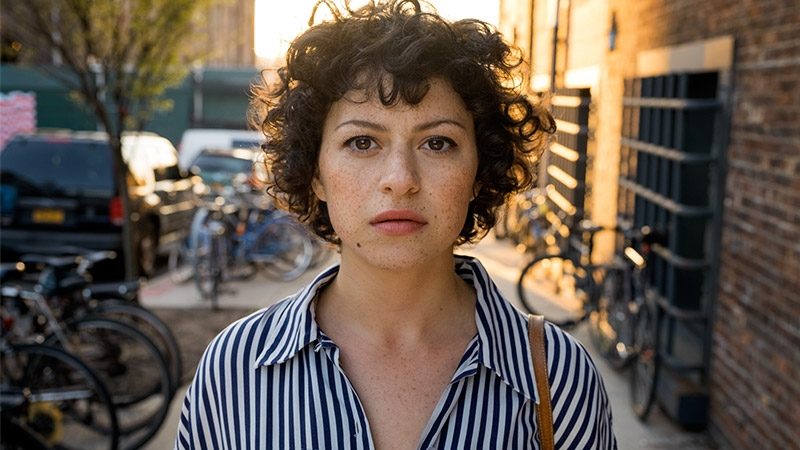More recently, she’s focused more on film with starring roles in Clea DuVall’s “The Intervention” and “Paint It Black,” Amber Tamblyn’s directorial debut with an adaptation of Janet Fitch’s subtly Sapphic subtextual novel. Tonight on TBS, Alia will return to TV as she leads “Search Party,” a dark comedy following her character, Dory, as she becomes infatuated with a friend from college who has gone missing.
When we first meet Dory, she has a vapid group of narcissistic friends, a boring boyfriend and a demeaning personal assistant job. A prospective employer (played by out comic Judy Gold) tells her that she can’t offer her a teaching position because she seems “immobile. Someone stuck, perhaps.” She’s not wrong, and Dory decides to find focus on something in her life, and that turns into her actively searching for her missing college acquaintance, Chantal.
“She kind of starts out at a place where she’s questioning herself a lot, questioning her purpose in things,” Alia told GO. “She’s kind of apathetic—which is slightly a comment on 20-somethings in this generation, you know. It has a different tone than just being like ‘gentrification and hipsters.’ It’s more like how much are we actually doing to support our own visions? What do you want to do? Everyone has value.”
Typically cast as “the sassy best friend” (“a lot of too smart for their own good kind of girls”), Alia said her more recent roles have given her the opportunity to “very different things” than what she’s been able to before.
“Even playing more slightly sexualized and more mature and damaged girls,” Alia said. “I usually play the one that has her shit together that’s kind of judging everybody.”
She says she finds a bit of herself in Dory—the questioning of herself, doubting relationships, deciding to accept things or swallow them—and she found it fun, just like the mystery aspect of the show.
“It’s really fun snooping around,” Alia said. “I’d catch myself in New York on off days like seeing a poster and doing the face, getting closer to it. Like I was really getting in this weird habit of being like ‘This might mean something.’ A lot of the show is about finding purpose in things because you give them value, not because there really is and how that’s trippy. Is anything really valuable, or is it really just our purpose on it?”
Alia has played a handful of queer characters on screen, including her roles in “The Intervention,” “Me Him Her,” Cherien Dabis’s “May in the Summer” and a particularly hilarious episode of “Broad City” where she plays Ilana’s doppelgänger/love interest. (They inevitably break up because Alia’s character doesn’t smoke weed, which is unacceptable for pot head Ilana.)
“In the community, in the LGBTQ community, especially now they’re naturally telling more honest stories,” Alia said. “So the people who are making films and a lot of people I’ve just been drawn to personally that I’m really good friends with are very much in that community, and they’re telling the most interesting stories. And a lot of those connections are personally-based—especially my career lately.”
The kind of honesty that Alia finds alluring in queer film is one she feels some in the industry still overlook, and the same could be said for films about women, too.
“We don’t have anything to hide so we’re just kind of telling straight up stories. Nothing veiled about it,” Alia said. “Once you start accepting it, telling normal stories from those perspectives—normal meaning it’s not commenting on the fact that they’re black or that they’re gay or whatever—that’s when I think the real effect comes in for an artist. I think that’s the most important to be like, ‘Yeah, we also deal with the same shit.’ But when you see it with a different character than some people are used to, you’re able to relate to that more instead of the film all being about the fact that they’re different.”
Search Party is of that queer but not explicitly queer ilk. One of Dory’s best friends is gay (played by John Early), and in a party scene, there are several visibly queer or gender non-conforming 20-somethings enjoying each other’s company. Despite the commentary Search Party makes on self-absorbed, social media-obsessed millennials, there’s also an open-mindedness to each of the characters who are less concerned about who someone sleeps with or identifies as than they are their Twitter following.
“I think that’s the value of this generation—at least the majority of it,” Alia said. “We don’t question. It doesn’t make a difference. We don’t have to define ourselves.”
As for if we could see her back to navel gazing and making out with Ilana on “Broad City,” don’t count it out.
“It was so much fun,” Alia said. I mean I would [return] gladly. Our characters kind of ended on a note where they don’t want to see each other any more. But yeah, she runs into me in a park, and I’m selling weed? She’s like ‘I thought you didn’t smoke weed!’ I’m like ‘Yeah, man—things have changed.’’
And that would be totally acceptable.
“Search Party” premieres tonight on TBS.


What Do You Think?